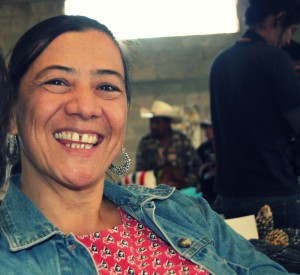SAVING MEXICAN CORN: A Tricky Business
An interview with ADELITA SAN VICENTE TELLO, Mexican Agronomist
January 1, 2009 we went to the border of Mexico with many farmer organizations. We were there because that was the day that NAFTA was completing its period of tariffs. Greatly reduced tariffs had been in force, that affected corn, sugar, milk and beans.
Our protest called for the Mexican government to re-negotiate with the incoming Obama administration, for fairer tariffs to protect Mexican farmers and lands, and to promote fair trade.
We formed a great coalition called “Sin Maiz, No Hay Pais”, Without Corn There is No Country – comprised of farmers’ organizations, environmental activists, defenders of human rights, scientists, media and other communications networks. Above all, we were fighting to keep GMO corn out of Mexico.
Neither the Obama administration nor the Mexican government paid attention to us. So we decided to take the law into our hands, as a way to defend our rights. We promoted legal instruments like protections, constitutional disputes, and citizen complaints against planting transgenic corn in Mexico.
In 2011 we had a legal victory: Now the Mexican constitution states our “right to a safe, sufficient and high quality nourishment”..July 5, 2013 we filed a collective lawsuit, a class action suit, in English. We were 53 people representing 20 farmers’ organizations, indigenous groups, my organization Semillas De Vida, prominent scientists, artists and celebrities, and human rights activists. We sued the Mexican government, Monsanto, Syngenta, Pioneer and others. We claimed that the GMO permits for big agribusiness were contaminating native Mexican corn. That was damaging our right to biodiversity, and the right of future generations. That is very important.
September 7, 2013 a judge ruled that, during the period of the court case and trial, all planting of GMO corn is prohibited in Mexico. Monsanto and the other defendants have challenged that ruling 90 times.
So while no GMO corn is being planted in Mexico, we are awaiting the trial of the lawsuit. Meanwhile, since September 29, 2009, we have been celebrating El Dia Del Maiz, the Day of Corn, not only in Mexico but internationally. In Mexico, farmers invite everyone to eat fresh corn, roasted in the fields. This day is supported by great artists like El Maestro Francisco Toledo, a very celebrated painter; and also Enrique Olvera, listed as Chef #16 in the Michelin guide!
The reasons for the activism are simple and clear: Monsanto and the other big businesses always say that GMO’s are the products most supervised in human history. But the reality is that after more than 20 years of having GMO’s in the market, every day there are more studies about dangers posed to our health by GMO’s..
In 2015, the issue of the herbicide glyphosate has been strong evidence of the danger. We know that the GMO’s are engineered for mandatory use with this herbicide. In March 2015 the World Health Organization determined that glyphosate is carcinogenic…and in June, France prohibited the sale of glyphosate.
In the USA the Salk Institute has spoken about the GMO proteins not being digestible, staying in the digestive tract and possibly causing so many allergies. We don’t want to eat GMO’s in Mexico.
My organization, Semillas de Vida, is not only saying no to GMO’s. We are saying yes to native seeds. We work with the farmers so they produce their seeds, we support them in conserving their seeds, and we partner with them in improving their seeds and plants.
Farmers in Mexico have understood very well the importance of their seeds. They have cared for them for 10,000 years. We help them to fight for the repatriation of lost seeds, from the large bank that exists in Mexico, so that those seeds are returned to the farmers.
The large seed bank in Mexico doesn’t belong to the Mexican government. It is a bank created with funding from the Rockefeller Foundation. Only multinational investors like Monsanto have access to that bank, and they patent the plants they grow with those seeds.
Tricky, no? This tricky business is very important for us. Mexico is the center of the origin of corn and other important species like squash, beans and tomatoes. Those resources Mexico gave to the world for free – and we don’t want to have them privatized.
This is a crucial issue about biodiversity. In 2016 there will be a meeting of the Convention of Biological Diversity. We want to discuss this issue there. Biodiversity belongs to the indigenous people, and to the farmers living in miserable conditions. We need justice for these people who have been the conservators of healthy seeds for 10,000 years.
WORLD BANK REPORT on the MACROECONOMIC EFFECTS OF THE TPP:


